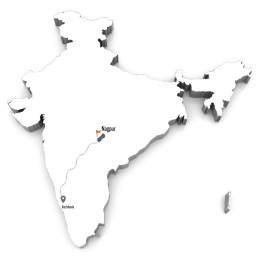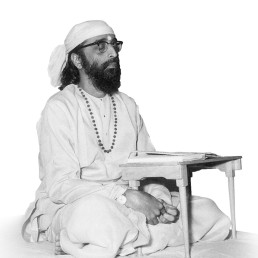
Jnana Yajna 74

Year & Dates:
October 03, 1960 to October 14, 1960

Yajna Topic:
Shrimad Bhagavad Gita- Chapter 13

Place:
Nagpur, India.
The forecast for the 74th Jnana Yajna in Nagpur predicted that a Chinmaya storm would impact not just people but several important organizations in that city. What happened exceeded the magnitude of the forecast because the Vedantic storm had the added punch of Shrimad Bhagavad Gita’s chapter 13.
Though the Grand Trunk Express pulled into Nagpur railway station two hours late, Pujya Gurudev lost no time in inspecting the yajnashala venue provisions made in the Nagpur University grounds and the University Hall.
On the evening of October 3, 1960, at the University Convocation Hall, Maha Mahopadhyaya Dr. V. V. Mirashi, president of the Gita Jnana Yajna welcomed Pujya Gurudev. After Dr. B. S. Niyogi inaugurated the function, Pujya Gurudev began the first of His eleven discourses on the 12th chapter of the Gita; He emphasized that “religion was a science, and its main work was to rehabilitate the human personality.”
The Versatile Knower of Every Field
The open air theater of Nagpur University was a refreshing and serene space. The dais on which Pujya Gurudev sat was decorated tastefully with green plants to simulate the sense of being in an ashram. The devotees were in awe as Pujya Gurudev brought out the glory of the bhakta, bhakti, and Bhagavan as expounded in Bhakti Yoga. They were captivated by His charming wit, His delightful sense of humor, and His incredible electrifying Presence.
The evening discourses were from 6-30 p. m. to 8 or even 8:45 pm. Additionally, during His short visit there, Pujya Gurudev infused the spirit of the Vedantic Renaissance during His many talks at various cultural organizations.
His address to the employees of the office of the Accountant general (Madhya Pradesh) on October 8, 1960, was about recognizing the “Joy of Work.” The next evening at 5 pm before His Gita discourses at the university, He stopped at the International Relations Club to speak on “World Problems and True Religion.” Pujya Gurudev explained how no problem of the new world was truly new; when every individual in a country adopts a value-based life according to the time-tested guidance of the wise prophets, the world’s issues get solved. On the 10th and 12th of October, Pujya Gurudev carried the spiritual theme to the Vishwapunarnirwana Sangh. Then, on October 13th, again at 5 pm, he spoke at the Akhil Bharatiya Vidyarthi Parishad on “Students and their Duties.”
That same night, after He completed the evening discourse on Chapter 12 of the Gita, He rushed to enlighten the members of the Rotary Club on the “Secret of Success” at 8:30 pm. Even on the final day of His Jnana Yajna, on October 14th, before His concluding discourse at the university, Pujya Gurudev addressed central and state government employees on the “Secret of Achievement.”
The hectic but happy 74th Jnana Yajna drew to a close on October 14, 1960. At the Guru Dakshina ceremony, the grateful audience donated Re. 10,000 for the Sandeepany Sadhanalaya before they received Pujya Gurudev’s yajna prasad, “At a Glance, Our Culture.”
Pujya Gurudev could move from one meeting to another most punctually, tailoring His message perfectly for the audience in different organizations.Through the years, the way He wielded time and thought was much above extraordinary.

“Think,” Says Pujya Gurudev
If a caravan of motor vehicles, manufactured by different companies with different horse-powers, at different periods of history, is put on the road, the performance of each vehicle will be unique. Thereby we shall not come to conclude that the petrol in each vehicle is of certain typical potency. The same electrical energy illuminates different electric bulbs manifesting different intensities of light at different points. The electricity is one, the petrol is one and yet the performance in the latter and the light manifested in the former are different from equipment to equipment because of the very quality of the equipment. This analogy can explain the wonderful idea expressed in the stanza under review.
Prakriti alone performs all actions:- Matter is the equipment that orders the types of action that should manifest. If the mind is bad, life expressed through it will also be bad. All actions are according to the type of desires retained by the intellect. Thus, in the presence of the Spirit the equipment’s(Prakriti) function, and the Self(Atman) functioning in the field, called the “Knower-of-the-Field” (Purusha), acts in the world outside. The “Knower-of-the-Field” minus the “Field”, there is no activity for the “Field”, nor is there any activity for the Self itself.
From Tyagi Magazine
How to Remove Ego?
Surrendering the ego leads to realization of divine existence within. Ego-driven desires hinder the manifestation of divinity. Liberation from suffering comes through egolessness and surrender to the divine will. Watch video to learn more.